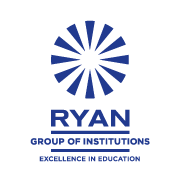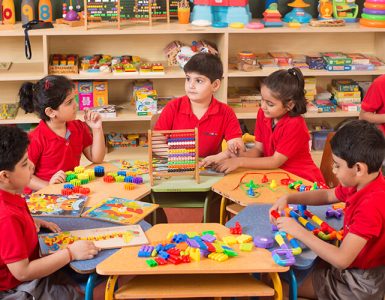Hello! let’s talk about a crucial concept that we believe significantly influences your child’s holistic growth—emotional intelligence. It’s at the heart of what we call social emotional learning, a term we frequently hear in the corridors of our schools.
What Is Emotional Intelligence?
Emotional Intelligence, coined by psychologists Peter Salovey and John D. Mayer, is the capacity to understand, manage, and effectively express one’s own feelings, as well as to engage and navigate successfully with those of others. Unlike traditional intelligence measures, it’s less about ‘book knowledge’ and more about understanding oneself and others.
Self-Awareness: Recognizing one’s emotions, strengths, weaknesses, values, and drives. It involves understanding how our feelings affect us, other people, and our performance.
Self-Regulation: Managing disruptive emotions and impulses. It’s about expressing our emotions appropriately.
Motivation: Being driven to achieve for the sake of achievement. A high degree of motivation fuels passion and persistence in the pursuit of our goals.
Empathy: Considering and understanding the feelings of others. Being able to get along well with others is a critical skill in any domain.
Social Skills: Managing relationships to induce desirable responses in others. This includes the ability to influence, mentor, and lead others.
Why Social Emotional Learning Matters?
You can’t let your emotions run your life, but you can’t ignore them either. They are a signpost to what you are thinking and how you are experiencing life in each moment
said the legendary Indian teacher and philosopher Jiddu Krishnamurti.
In the context of a rapidly evolving world, emotional intelligence acts as a beacon, guiding students to navigate the complexities of interpersonal relationships, emotional self-regulation, and motivation. It builds resilience, a trait much needed in today’s stressful times.
Furthermore, emotional intelligence influences the way children handle setbacks and accomplishments, deal with peer pressure, solve problems, and make decisions. It is a core skill that plays a pivotal role in determining a child’s ability to form strong relationships and cope with the pressures of growing up.
How Emotional Intelligence Influences Learning
Emotionally intelligent students are more likely to embrace challenges, be curious about new things, and take an active interest in learning. They view mistakes and failures as opportunities for learning and growth, leading to a more resilient approach towards their academic journey.
Emotional intelligence also promotes collaborative learning. Students with high emotional intelligence are often better able to work in teams, respect others’ perspectives, and resolve conflicts. They understand and manage their emotions and those of others, creating a more harmonious and conducive learning environment.
We understand the significance of emotional intelligence and are committed to fostering it in our children. As part of this commitment, we integrate emotional intelligence components into our curriculum and teaching methodologies, remember that every interaction with your child is a unique opportunity to foster emotional intelligence. As the old Indian proverb goes, “Every conversation is a chance for a new beginning.”
Emotional Intelligence: The Silent Catalyst for Academic Success
Now we delve deeper to discover the lesser-known correlation between emotional intelligence and academic success, a facet central to our focus on social emotional learning.
Beyond Grades: Unravelling Success in Academics with Social Emotional Learning
When we think about academic success, what usually comes to mind? Is it just good grades, or is there something more? For long, we’ve equated academic achievement with intelligence quotient (IQ), the ability to solve complex problems and memorize facts. However, the educational terrain is evolving. The spotlight is now on emotional intelligence as a key driver of a student’s overall performance.
Emotional intelligence is not just about understanding our feelings. It also involves managing emotions, nurturing a positive attitude, interacting effectively with others, resolving conflicts, and making sound decisions. These skills create an environment conducive to learning and thriving, thus boosting academic performance.
Learning Through an Emotional Prism
Now, you might be wondering how emotional intelligence or social emotional learning could affect cognitive learning, traditionally seen as a separate domain. Here’s how. When students learn to handle their emotions, it impacts more than their personal growth. It also influences their academic performance.
Students with high emotional intelligence have the ability to absorb and retain information more effectively. They manage stress better, enhancing their focus and leading to improved academic achievement. Additionally, being emotionally intelligent helps them keep a positive attitude towards their studies, persist in the face of challenges, and navigate the ups and downs of their educational journey.
The Role of Emotional Intelligence in Collaborative Learning
The modern education system emphasizes collaborative learning, and here too, emotional intelligence plays a crucial part. Students who understand their own emotions and those of others can work together more effectively. They build stronger relationships, can empathize with their peers, and maintain a balanced group dynamic. All these factors contribute to a healthier and more productive learning environment.
Unveiling the Evidence
So, is there any solid evidence backing the correlation between emotional intelligence and academic success? Indeed, there is. Various studies have shown a positive relationship between the two. For instance, research found that students with higher emotional intelligence achieved better academically and had a more constructive attitude towards learning. Clearly, emotional intelligence plays a transformational role in students’ educational journeys.
Charting the Course Ahead
EI, encompassing the ability to recognize, understand, and manage one’s own emotions, as well as empathize with others, is no longer seen as a secondary skill. Instead, it’s recognized as a critical component of a well-rounded education. This acknowledgment stems from extensive research demonstrating the link between emotional intelligence and academic achievement. Students with high EI tend to exhibit better stress management, greater motivation, and improved ability to navigate social complexities. These skills are crucial not only for academic success but also for personal growth and future professional endeavors.
In response to these insights, educators and institutions are increasingly seeking to integrate EI into their teaching methodologies. The aim is to cultivate these vital skills among students, preparing them not just academically, but also emotionally for the challenges ahead. This integration involves a variety of innovative methods, ranging from tailored emotional learning programs to incorporating EI-focused activities in the classroom.
By placing a stronger emphasis on emotional intelligence, educators are charting a new course in the educational journey. This approach not only enhances academic performance but also equips students with essential life skills, ensuring they are better prepared to thrive in an ever-evolving world. As we continue to embrace and integrate these concepts, the impact of emotional intelligence in shaping well-rounded, resilient individuals becomes increasingly clear, signifying a transformative step in the evolution of educational practices.
Social Emotional Learning: A New Vision for Curriculum Design
Let’s talk about how we plan to incorporate emotional intelligence into curriculum design. Our goal is to ensure that our students are not just academically proficient but also emotionally intelligent.
As the education reformer John Holt wisely said, “Learning is not the product of teaching. Learning is the product of the activity of learners.” Together, let’s make that activity as rich, engaging, and emotionally intelligent as possible. Recognizing the profound influence emotional intelligence has on academic success, we’re now poised to weave social emotional learning into the very fabric of our curriculum design.
Transforming the Curriculum: A Holistic Approach with Social Emotional Learning
True education extends beyond the boundaries of academic knowledge and skills preparation. It encompasses the nurturing of emotional well-being, resilience, and social skills. As such, embedding emotional intelligence in our curriculum design becomes not just important, but essential.
Our mission is to cultivate an environment that is cognitively stimulating and emotionally enriching. By doing so, we’re not only preparing our students for academic accomplishments, but also equipping them with the skills to lead fulfilling and successful lives.
Cultivating Empathy and Comprehension with Social Emotional Learning
One key aspect of embedding emotional intelligence into our curriculum involves fostering empathy and understanding among our students. Empathy allows students to comprehend the world around them more deeply, shaping their social interactions and their broader perspective on life.
Real-world Learning Experiences
One effective way to impart emotional intelligence is to integrate real-life situations into our teaching. Discussing real-world examples helps students to better identify, understand, and manage their emotions, thereby improving their problem-solving and decision-making skills.
Social Emotional Learning through Extracurricular Activities
Extracurricular activities offer a fantastic arena for students to experience emotions and relationships in a less formal, more practical setting. Whether it’s team sports, debates, drama, or other group activities, these experiences foster cooperation, teach conflict resolution, and highlight the importance of empathy, thereby refining their emotional intelligence.
Rethinking Assessment: Measuring Emotional Intelligence
Incorporating emotional intelligence into our curriculum also demands that we revise our methods of assessment. We’re committed to finding ways to evaluate emotional intelligence skills, along with traditional academic assessment. This ensures we’re nurturing our students as whole individuals—intellectually, socially, and emotionally.
Bridging the Gap: Infusing Social Emotional Learning in Classroom Teaching
As we embark on this journey of integrating emotional intelligence into our curriculum design, we look forward to your unwavering support and active participation. As we’ve walked through the intertwined paths of emotional intelligence and academic success, we’ve begun to grasp the crucial role it plays in reshaping our curriculum design. Today, let’s dive a bit deeper. Let’s explore the ‘how’ of weaving social emotional learning into the fabric of everyday teaching.
Practical Applications of Emotional Intelligence
As we steer towards this transformative direction, we face an essential question – how can we infuse emotional intelligence into our daily teaching practices? The answer lies in innovative thinking, empathetic understanding, and continuous practice.
Revamping Teaching Techniques: Harnessing the Power of Emotions
A pivotal part of our approach is reimagining our teaching techniques. We must pay attention not only to the ‘what’ but also the ‘how’ of our teaching. This involves devising lesson plans that engage not just the intellect but also the emotions of our students.
Consider this: while teaching history, we can delve into the emotions, aspirations, and challenges of the people we study. This approach makes the lessons more relatable and engaging, prompting students to exercise their emotional intelligence.
Extracurricular Activities: Stimulating Emotional Growth
We’ve previously discussed the role of extracurricular activities in fostering emotional intelligence. Let’s probe a little deeper. Activities such as drama, debate, and team sports can be specifically designed to encourage empathy, self-awareness, and emotional regulation. For instance, in team sports, we can guide students to reflect on their feelings during a game, understand their teammates’ perspectives, and manage their emotions for maintaining team harmony.
A New Lens for Assessment: Social Emotional Learning
Assessment represents yet another domain where the infusion of emotional intelligence can be transformative. Predominantly, traditional assessments have been centered around gauging knowledge and skills. However, our perspective is that assessments should not only measure but also cultivate emotional growth. By integrating elements like self-reflection assignments and group projects that necessitate emotional skills, we are positioned to develop a more comprehensive and rounded portrait of a student’s growth and development.
The Road Ahead: The Invaluable Role of Parents
This journey of integrating emotional intelligence into our educational system extends beyond the confines of school walls, seamlessly weaving its way into your homes. As parents, your role is invaluable, acting as a pivotal catalyst in reinforcing the lessons of emotional intelligence that your children absorb at school. Indeed, by working in tandem, we can create an environment that is not only academically stimulating but also rich in emotional nurturing.
In the ensuing discussions, we will delve deeper, providing you with specific pointers and resources designed to assist in cultivating your child’s emotional intelligence right at home. We are keenly looking forward to your insights, experiences, and suggestions, as your contribution is essential to this shared endeavor.
let us draw inspiration from the profound words of Helen Keller, who wisely stated,
The best and most beautiful things in the world cannot be seen or even touched – they must be felt with the heart.
Embracing this philosophy, let us collectively guide our children in feeling, understanding, and adeptly navigating their world with a well-honed emotional intelligence.




